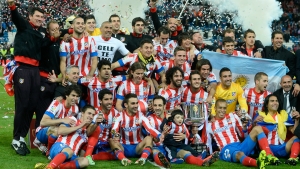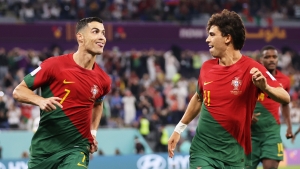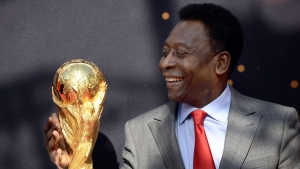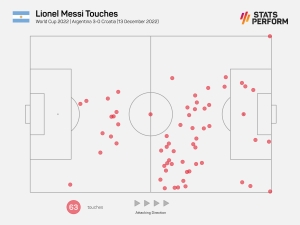France were above the clouds when the news came from Karim Benzema, and a thought came to mind: had he ever been more distant, figuratively or literally, from Les Bleus?
Retiring from international football at the age of 35 is the sort of thing that would not usually raise many eyebrows.
Yet Benzema's announcement, and its timing, caused a fresh quake, even as the tremors from Sunday's World Cup final were still being felt.
Why had it come the day after that momentous game? Was it coming today, win or lose yesterday? Why had Benzema interrupted his own birthday to release the news? Had he waited for the team flight to depart from Qatar before dropping his bombshell?
And why, almost above all, was the announcement so curt? Just 160 characters (in its original French format) to put the lid on a story of 97 caps and 37 goals for Les Bleus.
"I made the efforts and the mistakes it took to be where I am today and I'm proud of it! I have written my story and ours is ending," Benzema signed off.
He's taking the kids, the car and the dog, and the house is in his name, and he'll be back for his train set, don't you worry about that. Forget counselling, here's your divorce papers.
It felt like an entirely apt ending to what has been often an unhappy marriage between Benzema and the France national team.
There were 15 years and 77 days between his first and last caps, and his goals haul ranks fifth on the team's all-time list. He was man of the match against Spain in a Nations League final triumph last year, but it will be Benzema's near six-year absence from international duty that most likely defines him as a France player.
Because what else are you remembering? Sure, he was a starter at Euro 2012 and the 2014 World Cup, but France went out in the quarter-finals each time. And yes, there was certainly that Nations League win, but such a soupcon of success hardly satisfied Benzema's hunger for a proper platter.
He had been starved of the prospect of such a feed at Euro 2016, where France reached the final but lost out to Portugal, and again at the 2018 World Cup, where they beat Croatia in the final.
If it had come down to ability, Benzema would have been a part of those French feasts, but his exclusion from each squad, and his absence from national team service between the 4-0 win over Armenia on October 8, 2015, and the 3-0 victory against Wales on June 2, 2021, was not about Benzema's playing merits.
In November 2021, Benzema was handed a one-year suspended prison sentence and fined €75,000 after being found guilty of complicity in the attempted blackmail of Mathieu Valbuena, a former international team-mate, in a case dating back to June 2015.
He always denied the accusations, having been accused of helping four other men blackmail Valbuena over an intimate video that had been taken from Valbuena's mobile phone. The other four defendants were also found guilty.
France froze Benzema out before any court verdict, excluding him essentially from the point of the allegations coming to light almost until the moment the verdicts were delivered.
French Football Federation president Noel Le Graet announced in November 2019 that Benzema would never play for France again.
"Karim Benzema is a very good player, I've never cast his qualities into doubt," said Le Graet. "On the contrary, he shows at Real Madrid that he is one of the best players in his position. But the France adventure is over."
This story could have been so different. Benzema captained France during a friendly against Brazil in March 2015, and during his absence from the national team his trophy tally at Madrid stacked up spectacularly.
He was dramatically recalled in time for the delayed Euro 2020 finals, which were held last year, saying he felt "so proud" to be back, with Didier Deschamps noting there had been long discussions that opened that door. France then exited at the last-16 stage, despite Benzema making a positive contribution on the pitch.
And now, barely 18 months later, the door that was pushed ajar has closed, with Benzema this time doing the shutting down of his international career, rather than the FFF.
His final cap came in a 1-0 home defeat to Croatia in the Nations League, back in June. He should have figured in France's World Cup squad, but when he aggravated a thigh injury on the eve of the tournament it was announced he would play no part in the Qatar 2022 campaign.
Then, when rumours swirled that Benzema might make a comeback in time for the final, Deschamps quashed the prospect.
"That doesn't interest me," Benzema subsequently posted on Instagram, a somewhat cryptic message. You took what you wanted from that remark, but it was hardly a good-luck message to the squad ahead of the final against Argentina.
So what happened for it to end this way, with seemingly little love on either side?
Former France defender Eric Di Meco told RMC Sport: "For me, it is a huge mess. A guy who plays so much time at Real, so strong, who is a Ballon d'Or winner, and who has never been able to express himself in the France team.
"There is his responsibility, and it is good that he says that there are mistakes. But for me, it's a mess at the level of the France team."
France will survive this, of course. They should have Kylian Mbappe around for the next decade, rewriting the record books.
But it takes an expert, perhaps, to judge what France have lost with news of Benzema's retirement.
Zinedine Zidane, who might yet be the next France coach, and possibly sooner rather than later, was asked after a Real Madrid game in December 2020 whether he considered Benzema to be the greatest French forward of all time.
"As far as I'm concerned, yes, he is," Zidane said. "He's showing it with all he's achieving. He's been at Real Madrid for a long time, he's played over 500 games, the goals... Really, the trophies he's won speak for themselves.
"For me, he's the best there is, no doubt about it."
After Zidane left Madrid, Benzema's performances went to still greater heights, hitting 44 goals in 46 games for Madrid last season, lifting the Champions League and LaLiga trophies as captain.
High up in the skies on Monday, the retirement news probably reached Deschamps and the returning France squad.
Benzema's tale of 'here's what you could have won' has arrived at a sad denouement, with Deschamps surely guessing he would face press interrogation about the striker on landing in Paris. And in that respect, plus ca change.









































